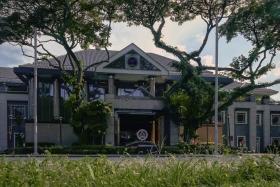Why the rich choose Singapore citizenship
Powerful passport, excellent quality of life and attractive tax regime are key reasons the country is a preferred destination
Singapore has been a global powerhouse in recent years and is fast becoming one of the most desired residence and citizenship options in the world today.
According to the Global Competitiveness Report by the World Economic Forum, Singapore is the best country in Asia - and third in the world - to work in, and the best country in Asia in terms of quality of life.
It also performed well on the Quality of Nationality Index. It came in first in South-east Asia and 35th globally.
Singapore's stellar performance on a global level is a result of its strong economy, high level of human development and peacefulness.
To this end, demand for Singapore citizenship is flourishing, with the Government capping the total number of citizenships granted each year at 25,000.
Singapore's strategic location is one of the key factors that makes it an ideal destination for conducting business.
It is situated at a crossroads between the East and West - one of the world's most important trade routes.
Owners of a Singapore passport are also granted unmatched travel freedom, which facilitates the ease of travel for both business and leisure.
Singapore ranks first in the world on the 2018 Henley Passport Index, alongside Japan, providing visa-free or visa-on-arrival access to 189 destinations.
This includes access to some of the world's most progressive economies including Switzerland, Denmark and Finland.
These reasons shed light on the country's successful international relations with other countries, including major global economies.
Another vital factor driving demand for Singapore residence is the attractive tax regime.
HIGH NET WORTH
In recent years, there has been keen interest and a steady demand for Singapore citizenship among the large pool of high-net-worth (HNW) Singaporean residents from other countries. This is particularly the case with the rich from Indonesia, India and China, who are seeking alternative citizenship and residence in more tax-efficient jurisdictions.
However, the acquisition of alternative citizenship does not alter one's tax situation - what matters is tax residence.
Singapore has set an example for the rest of the world in terms of cultivating a culture of innovation and entrepreneurship. This has been made evident through strong governmental support, including the provision of grants and incentives that aim to promote entrepreneurship, such as through tax rebates.
To reinvent itself as a global destination for business, the country has also introduced schemes such as the Global Investor Programme (GIP), opening itself up to foreign investment.
The GIP is unique in that it accords those who invest in the country with permanent residency. Many investors use this as a stepping stone to apply for citizenship after holding PR status for at least two years.
The growth of HNW individuals and ultra-HNW individuals in Asia has far outpaced those in other regions.
With the objective of attracting these individuals, the Government has taken strides in the past decade.
These efforts have paid off - Singapore has seen steady development as a global financial centre and successfully positioned itself as a preferred destination for wealthy families to manage their assets and investments.
When it comes to a choice between jurisdictions, individuals are not simply choosing a location for wealth management, but also a place where the interests of the family can be best served and safeguarded.
As such, HNW individuals are increasingly coming to the city-state to manage investments, given domestic capital controls and attractive tax exemption schemes for managing funds run by family offices based here.
The writer is managing partner and head of South-east Asia, Henley & Partners Singapore, a citizenship and residence advisory firm.
Get The New Paper on your phone with the free TNP app. Download from the Apple App Store or Google Play Store now

